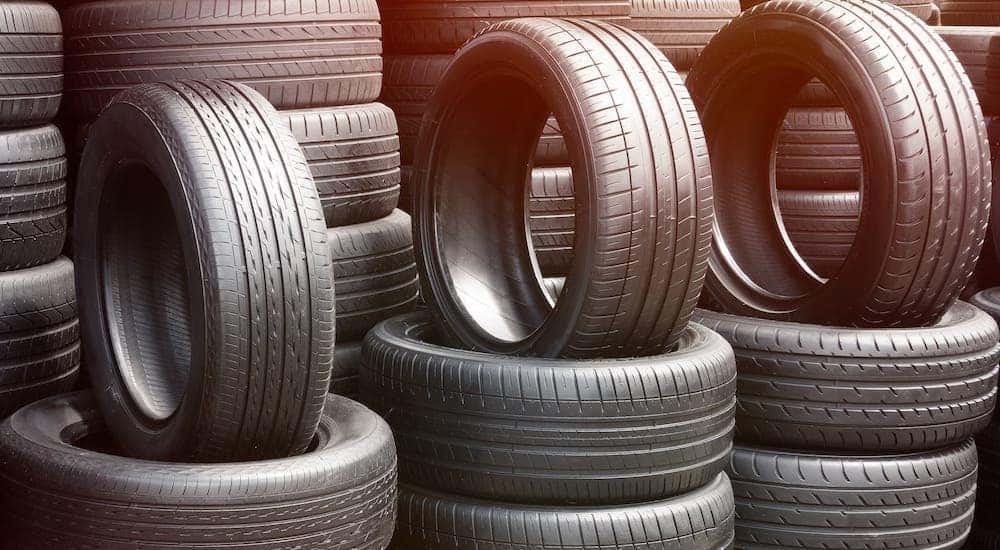Morris Tire Service: Where Precision and Performance Converge
Morris Tire Service: Where Precision and Performance Converge
Blog Article
The Ecological Advantages of Correct Tire Upkeep
Keeping correct tire treatment is typically ignored, yet its influence on the atmosphere is extensive. From minimizing fuel usage to reducing discharges output, the advantages are far-reaching. Correct tire upkeep not only prolongs the lifespan of tires however also lowers landfill waste and contributes to boosted air top quality. The interconnectedness of these benefits highlights the vital role that basic upkeep practices can play in promoting environmental sustainability.
Reduced Fuel Usage
Improving tire upkeep techniques can lead to a substantial reduction in fuel usage for automobiles. According to the United State Division of Energy, underinflated tires can reduce gas mileage by 0.2% for every 1 psi decrease in pressure in all 4 tires.
Along with tire pressure, routine tire turnings and placements likewise play a critical duty in gas effectiveness. Unevenly used tires can boost gas usage as the engine functions harder to maintain rate and grip. By keeping correct placement and rotating tires at recommended periods, chauffeurs can ensure even extend the life and put on of their tires, inevitably saving fuel and decreasing their carbon impact.
Extended Tire Life Expectancy
Prolonging the lifespan of tires is an essential facet of effective car upkeep practices that can generate price savings and environmental advantages in the long run. By appropriately maintaining tires, vehicle drivers can dramatically prolong their functionality, reducing the frequency at which new tires require to be produced and old ones thrown away. This not just saves important resources yet also decreases the energy and exhausts connected with tire production and disposal processes.
Regularly inspecting tire pressure, rotating tires, and making certain appropriate alignment are necessary action in expanding tire life expectancy. Sufficient step depth is important for optimal traction and safety and security, yet it additionally plays a function in exactly how long tires can be utilized prior to needing replacement. Furthermore, avoiding aggressive driving actions that accelerate tire wear, such as extreme stopping and sharp turns, can further enhance tire durability.
Inevitably, enhancing the longevity of tires with positive maintenance not just benefits the atmosphere by lowering waste and preserving sources but also results in set you back savings for car proprietors by postponing the requirement for new tire purchases.
Reduced Discharges Outcome
Reliable tire upkeep practices contribute to a reduction in discharges output, lining up with environmental sustainability objectives in the auto sector. Properly filled with air tires, routinely turned and lined up, can improve gas performance, therefore lowering the total co2 exhausts from lorries. When tires are underinflated, the engine should work tougher to propel the vehicle, leading to raised gas usage and higher emissions. check By preserving ideal tire pressure levels, chauffeurs can assist minimize these unfavorable ecological Visit Website influences.
Additionally, well-kept tires additionally boost grip and decrease rolling resistance, further improving fuel efficiency. This, subsequently, decreases the quantity of exhaust gases released into the environment. In addition, making sure tires are properly pumped up and lined up can extend the lifespan of the tires, decreasing the regularity of tire substitutes and the linked ecological costs of tire manufacturing and disposal.

Lowered Garbage Dump Waste
Provided the positive impact of appropriate tire upkeep on minimizing discharges outcome, one more substantial ecological benefit is the potential for decreased landfill waste. By making certain that tires are properly blown up, straightened, well balanced, and revolved regularly, their life expectancy can be substantially prolonged.

Improved Air High Quality
Enhancing air top quality through proper tire maintenance methods is a crucial facet of sustainable environmental stewardship. When tires are underinflated, they produce a lot more rolling resistance, bring about increased fuel intake and higher discharges of unsafe toxins such as carbon monoxide and nitrogen oxides. Appropriately inflated tires not only enhance gas efficiency but additionally reduce the quantity of toxins launched right into the air.
Additionally, well-kept tires with appropriate walk depth and positioning add to much safer motoring problems, reducing the possibility of mishaps that can cause the check my source release of additional contaminants into the atmosphere. By extending the life-span of tires via regular maintenance and turning, less tires are discarded prematurely, reducing the environmental impact of tire disposal and production procedures.
Conclusion
To conclude, appropriate tire upkeep offers many environmental benefits. By decreasing fuel usage, prolonging tire life expectancy, reducing emissions result, lowering garbage dump waste, and enhancing air high quality, people can add to a healthier world. These efforts not only profit the setting yet also help to preserve resources and lower general ecological effect. It is necessary for people to prioritize tire maintenance as a simple yet reliable means to secure the environment for future generations.
Correct tire maintenance not just extends the life expectancy of tires however likewise decreases landfill waste and adds to boosted air quality - morris tire. By preserving correct positioning and rotating tires at suggested periods, vehicle drivers can make sure even wear and prolong the life of their tires, eventually conserving fuel and minimizing their carbon footprint
By effectively preserving tires, drivers can dramatically prolong their use, lowering the frequency at which brand-new tires need to be produced and old ones disposed of.On a regular basis inspecting tire pressure, turning tires, and making sure proper placement are important actions in expanding tire life expectancy. Additionally, guaranteeing tires are effectively inflated and lined up can extend the life expectancy of the tires, lowering the regularity of tire substitutes and the linked ecological expenses of tire manufacturing and disposal.
Report this page